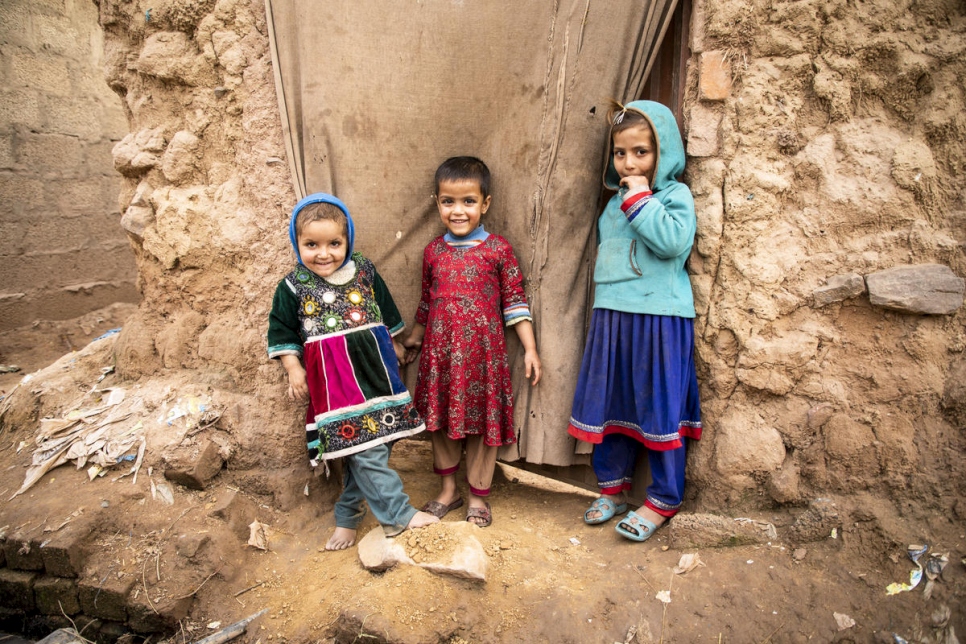Four decades and counting: An urgent need to rekindle hope for millions of Afghan refugees
This is a summary of what was said by UNHCR spokesperson Andrej Mahecic – to whom quoted text may be attributed – at today's press briefing at the Palais des Nations in Geneva.

Afghan children stand in a doorway at a settlement in Islamabad, Pakistan, that is home to about 3,000 Afghan refugees. © UNHCR/Roger Arnold
UNHCR, the UN Refugee Agency, is calling on the world not to let hope fade for millions of displaced Afghans, impacted by more than four decades of unrest in Afghanistan and their host communities in the region.
The Government of Pakistan and UNHCR are jointly convening a ministerial meeting in Islamabad next week to send a global reminder about the fate of millions of Afghans living as refugees, many of whom feel the rest of the world may have already abandoned them. This is an impression that we must prove wrong.
For more than 40 years, Afghans have continued to flee violence, war, conflict and natural disasters. Neighbouring countries – like Pakistan and Iran -- continue to show remarkable generosity by providing refuge to millions of Afghan women, children and men, all with little recognition and decreasing international support.
Afghanistan, today, has a population of 35 million people. Nearly 25 per cent are former refugees who have returned home in the last 18 years, while more than a million people are displaced internally.
Some 4.6 million Afghans – including 2.7 million registered refugees still live outside of the country. Around 90 per cent of them are being hosted by Pakistan (1.4 million) and Iran (1 million).
In an upsetting trend, Afghans are the largest group of asylum-seekers currently arriving in Europe.
Against this backdrop of ongoing need, global support for the Afghan refugee situation has been on the decline. UNHCR has seen funding levels drop for its already under resourced operations in Afghanistan, Pakistan and Iran over the years – making it hard to invest in Afghan lives and continue support to affected local host communities.
More than a million Afghan refugees, living in Pakistan and Iran, are children under the age of 14 with almost three-quarters are under the age of 25.
Underfunding severely affects efforts to educate and empower young Afghans in exile, who will play the leading role in rebuilding their communities upon return. Failing to do so brings with it immense risks for an uneducated youth in a region prone to radicalization.
The international conference -- on 17-18 February -- highlights the generosity, hospitality and compassion of Pakistan, Iran and other countries in hosting one of the world’s largest and longest-standing refugee populations.
It is also an opportunity for international solidarity and responsibility sharing, both to ease pressure on host countries currently under immense strain, and to create the conditions necessary for the sustainable return and reintegration of Afghan refugees to their homeland.
Ongoing efforts to achieve a peace settlement in Afghanistan have again generated hope among Afghans refugees about the possibility of return. The conference will be an important precursor for the way forward.
For more information on this topic, please contact:
- In Islamabad, Babar Baloch, [email protected]unhcr.org, +41 79 513 9549
- In Islamabad, Qaiser Khan Afridi, [email protected], +92 (0) 300 501 8696
- In Kabul, Mohammad Nader Farhad, [email protected], +93 791 99 00 18
- In Tehran, Farha Bhoyroo, [email protected], +98 912 132 7183
- In Bangkok, Kasita Rochanakorn, [email protected], +66 646 168 325
